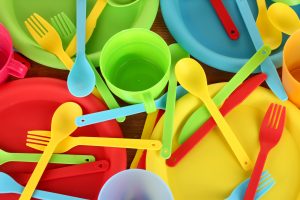
Spaeth suggests that higher temperatures and acidic food could cause melamine to contaminate food, especially in older or lower quality dinnerware.
The Taiwanese study included 12 healthy men and women who ate hot soup from either melamine or ceramic bowls. Urine samples were collected 12 hours after consumption. After three weeks, those who used a melamine bowl switched with those who used ceramic bowls, and urine samples were collected again.
Within 12 hours of consuming soup from a melamine bowl, melamine levels in urine were 8.35 micrograms, compared to 1.3 micrograms when they ate from the ceramic bowls.
Team lead Chia-Fang Wu said, “Melamine tableware may release large amounts of melamine when used to serve high-temperature foods. The amount of melamine released into food and beverages from melamine tableware varies by brand, so the results of this study of one brand may not be generalized to other brands.”
The consequences of the melamine effects on the body are still unclear, but previous research showed that low-dose melamine increases the risk of kidney stones.
Melamine in tableware and health risk
Melamine can be found in all types of dinnerware, including cooking utensils, plates, plastic products, paper, paperboard, and industrial coatings. In some parts of the world, melamine is even used in fertilizers. Melamine may be used in food packages, but it is not FDA-approved for direct addition to human food or animal feeds.
The FDA suggests that using plastic tableware made from melamine is generally safe to use as long as it is not heated at high temperatures to prevent food contamination. Always be mindful of labels indicating whether the item can go in the microwave.
Risks associated with high consumption of melamine as outlined by the FDA include kidney stones, kidney failure, and even death. Signs of melamine poisoning include blood in urine, irritability, little or no urine, signs of a kidney infection, and/or high blood pressure.
Related Reading:
Kidney stones, chronic kidney disease risk may increase with high temperatures: Study
Kidney stones and chronic kidney disease risk may increase with high temperatures. As warmer weather is upon us, the risk of kidney stones is rising, according to research. Researchers found that kidney stone cases are on the rise when the temperatures are hot. They uncovered this association by examining 60,000 Americans in several U.S. cities. Continue reading…
Kidney stone natural remedy combines lemon juice and olive oil
Kidney stones natural remedy combines lemon juice and olive oil. Mineral formations are to blame for kidney stones, which are described as one of the most painful experiences one can go through. Kidney stone relief is highly necessary, as the pain can be debilitating and overwhelming. Continue reading…
Sources:
https://consumer.healthday.com/environmental-health-information-12/environmental-medicine-news-234/could-chemical-in-dishware-raise-your-risk-for-kidney-stones-672656.html
http://www.fda.gov/Food/FoodborneIllnessContaminants/ChemicalContaminants/ucm199525.htm